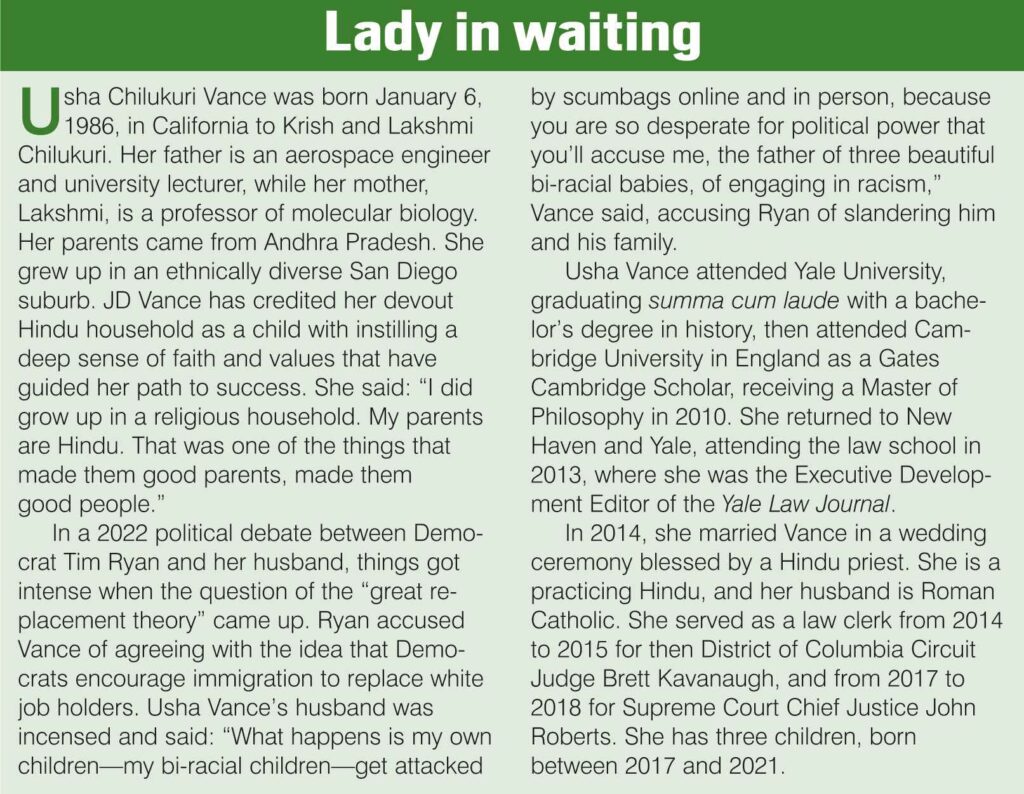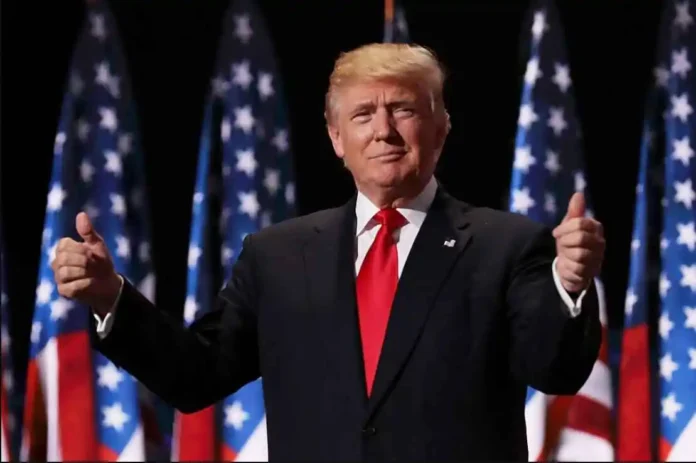By Kenneth Tiven
It could easily be the script for a Netflix series. Many twists and turns remain, but this is a real-life national drama. The ending is not available until November 5. What comes after that could redefine the USA. To paraphrase the late film script writer William Goldman (Princess Bride, Butch Cassidy and the Sundance Kid): “Nobody knows anything…. Not one person in the entire political field knows for a certainty what’s going to work. Every time out it’s a guess and, if you’re lucky, an educated one”.
The Republican National Convention opened with Donald Trump’s nomination by acclamation as a presidential candidate for the third time. Project 2025, perhaps the other star of the MAGA-dominated Republican Party, is getting no official attention because it is too controversial. However, encouraged by Trump, it is a 900-page blueprint for dismantling almost every federal agency that deals in human services. Its proposals are contentious restrictions: anti-immigration language, deportation of non-citizens, and prohibitions on all matters involving sexual relations, to name just a few. This goes well beyond abortion issues. It contravenes key elements of the US Constitution. Basically, it proposes that an ethnic and religiously diverse America accept what MAGA supporters (a minority) believe: the USA is a Christian nation.

From a historical perspective, this nominating convention is no longer about people, ideology, domestic or international policies. Social media, connected by the Internet, hosts those ideas in the 21st century. Today’s four-day convention is a media extravaganza to energize existing voters and attract new ones. The overall design tries to make Trump and Republicans at all election levels, seem invincible on behalf of societal values they believe existed 100 years ago.
That Trump is perceived as a demi-god for his movement was confirmed a week ago in Pennsylvania. A 20-year-old would-be assassin with a rifle wounded him—just clipping his right ear—from a position 450 metres from the rally podium. Military snipers on another building’s roof apparently saw him only as he fired the first shots. Within seconds they killed him. Three days later Trump, with ear bandaged, walked into the Republican National Convention in Milwaukee, Wisconsin, to cheers. A friend who follows Republican politics closely described the delegates, “as looking like a college reunion for the Class of 1974 from Liberty University, a religious and politically conservative school.”
A jubilant crowd welcomed the former president to the Convention stage and was rewarded with more than an hour of vintage Trump, extemporaneous, making it clear that a brush with an assassin’s bullet had left him no less outrageous than usual when a crowd feeds his need for validation.
“I’m not supposed to be here tonight, Trump said recounting the assassination attempt: “The amazing thing is that prior to the shot, if I had not moved my head at that very last instant, the assassin’s bullet would have perfectly hit its mark, and I would not be here tonight. We would not be together.” The crowd chanted: “Yes you are!”
It was a mix of old vows and some new ones, with facts often missing or fuzzy. He never said, as he has in the past, that he wants to be a dictator on day one, but his anti-immigration theme was clear: borders will be locked, and the deportation of people without legal status will be “the largest deportation operation in the history of our country.”
To generate interest in the coming campaign, Trump reprised a past business experience. His search for a vice-presidential running mate was organized like a beauty pageant, keeping at least four candidates dangling until the last moment. The selection of JD (James David) Vance is not without skeptics, given Vance’s 2016 vocal opposition to Trump, including calling him an American version of Hitler.
Vance’s Indian-American wife introduced him to the convention before his speech. Vance’s tone was aggressive, but his style leaned to the bland side. He made it clear that his troubled early life in a poor family would help him fight “for the people who built this country”. His religious, foul-mouthed grandmother raised him, he said, citing memories of friends and acquaintances from his old neighbourhood who had died of drug overdoses. Vance positioned himself as the champion of Trump’s white, working-class political base. “I pledge to every American, no matter your party, I will give everything I have, to serve you and to make this country a place where every dream you have for yourself, your family and your country will be possible once again.”
This choice for vice-president reflects the need to win in several smaller, more rural, swing states where the electoral votes will put Trump back in the White House. Trump’s assumption is that it helps that Vance’s background is in Appalachia, that area of southern Ohio, Kentucky, and Tennessee that remained coal and timber country for most of the 19th and 20th centuries. His career as a lawyer with solid connections to rich hi-tech entrepreneurs goes unmentioned. After the 9/11 terror attack, he joined the Marines and served as a combat journalist. Then he went to Law School.
Vance has an intimate connection with India. He married his wife, Usha Chilukuri Vance, after the couple met at Yale University’s law school. She was born in California, the daughter of Telugu-speaking emigrants from Andhra Pradesh. At the time of his wedding, Vance legally adopted the surname of his grandparents, who had a big role in raising him, as recounted in the best-selling book Hillbilly Elegy. Working as a venture capitalist in Silicon Valley introduced him to wealthy hi-tech capitalists who clearly made an impression with their generally Libertarian views on government.
The Elegy book earned Vance a reputation as someone who could help explain Trump’s appeal in middle America, especially among the working class. These rural white voters helped Trump win the presidency. After disparaging Trump’s behaviour in the 2016 campaign, he created an anti-opioid charity and became a lecturer, telling his personal story, including hardships because of his mother’s drug addiction. The response encouraged him to enter politics, taking a long-shot chance at replacing retiring Ohio Republican Senator Rob Portman in the 2022 election.
Trump endorsed Vance, apparently on his son Don Jr.’s advice. Vance won. At this point, he has merely 19 months of elected political experience, but an abundance of ambition. His political compass has swung 180 degrees to align with Trump, but he is far more coherent than Trump on issues of economics, foreign policy, and family planning. The former Marine is not shy about political combat, aggressively blaming Democrats for the attempted assassination of Trump. His working-class roots may appeal to the men and women of the American Rust Belt that are critical to Trump’s campaign.
Trump is prioritizing loyalty and legacy over qualities that past presidents have sought in vice-presidential nominees. Vance’s evolution from opponent to running mate demonstrates the zeal of a convert. An older generation of Republicans is not likely to get much support from Vance, who defended Trump’s “stolen election allegations” after the 2020 election. The 39-year-old Vance is a realist who understands Trump, limited to two terms, can’t run again and may even die in office, putting him in a good position for 2028.
Vance represents Trump’s plan to make the Republican Party his own, moving from Ronald Reagan’s belief in religious conservatism, free-market capitalism and hawkish internationalism. Cooperation and concern for global issues is dramatically diminished in the Trump view, except for more cooperation with Russia, seen most visibly in opposition to aid for Ukraine to resist an invasion. Once rabidly anti-Communist, today, Republicans have instead focused all their animosity on Democrats in America. Additionally, several speakers at the convention have attacked gender issues and other elements of an evolving America on the liberals who are elements of the Democratic party.
Joe Biden’s re-election campaign chair, Jen O’ Malley Dillon told reporters: “Trump picked JD Vance as his running mate because Vance will do what Mike Pence wouldn’t on January 6: bend over backwards to enable Trump and his extreme Maga agenda, even if it means breaking the law and no matter the harm to the American people.” President Biden’s efforts to stay in the presidency is not helped by Democrats, now including former House Speaker Nancy Pelosi and others, suggesting he retire. Biden also has a mild case of Covid which probably isn’t helping his disposition.
Zack Beauchamp, author of new book, “The Reactionary Spirit: How America’s Most Insidious Political Tradition Swept the World”, writes that Vance, “is a man who believes that the current government is so corrupt that radical, even authoritarian steps are justified in response” seeing “himself as the avatar of America’s virtuous people, whose political enemies are interlopers scarcely worthy of respect. He is a man of the law who believes the president is above it.”
Polling in the past week indicates the election remains very close, neither a win for Republicans nor a loss for Democrats. There are a very long eleven weeks before we know how this American drama ends.
—The writer has worked in senior positions at The Washington Post, NBC, ABC and CNN and also consults for several Indian channels


